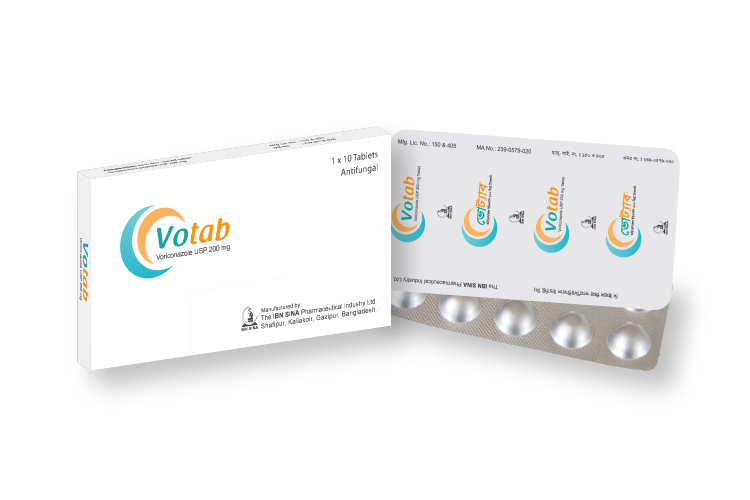
VOTAB
VORICONAZOLE USP
| NAME | STRENGTH | PACK SIZE | DOSAGE FORM |
|---|---|---|---|
| VOTAB 200 MG | 200 MG | 10 S | TABLET |
Tablet:Each film coated tablet contains Voriconazole USP 200 mg.
Voriconazole is a triazole antifungal medication used to treat serious fungal infections.
The primary mode of action of Voriconazole is the inhibition of fungal cytochrome P450
mediated 14 alpha-lanosterol demethylation, an essential step in fungal ergosterol biosynthesis
Voriconazole is indicated in adults and padiatric (2 years of age and older) for the treatment of following fungal infections:
• Invasive aspergillosis
• Candidemia (Non-neutropenic) and disseminated candidiasis in skin, abdomen, kidney, bladder wall and wounds
• Esophageal candidiasis
• Serious infections caused by Scedosporium apiospermum and Fusarium Species including Fusariumsolani
• Patients intolerant of, or refractory to other therapy.
Voriconazole is to be taken at least one hour before or one hour following a meal.
For Patients 40 kg or above: Loading Dose: 400 mg twice daily (for the first 24 hours).
Maintenance Dose: 200 mg twice daily (from the 2nd day).
For Patients less than 40 kg:
Loading Dose: 200 mg twice daily (for the first 24 hours) Maintenance Dose: 100 mg or 150 mg
twice daily (from the 2nd day). Treatment duration should be as short as possible depending the
patient's clinical and mycological response.
Known hypersensitivity to Voriconazole or any other components of this drug-
• Co-administration with terfenadine, astemizole, cisapride, pimozide or quinidine, sirolimus due to risk of serious adverse reactions
• Co-administration with rifampin, carbamazepine, long-acting barbiturates, efavirenz, ritonavir, rifabutin, ergot alkaloids and St. John's Wort due to risk of loss of efficacy
Long term exposure (treatment or prophylaxis) greater than 180 days requires careful
assessment of the benefit-risk balance. Squamous cell carcinoma of the skin (SCC) has been
reported in relation with long-term voriconazole treatment.
The most common side effects are abdominal pain, anemia, blurred vision, headache, chest pain, nausea and diarrhea.
There are no adequate and well-controlled studies in pregnant woman. It should be used during
pregnancy only if the potential benefit justifies the potential risk to the fetus. The excretion of
Voriconazole into breast milk has not been investigated.
Safety and effectiveness in pediatric patients below the age of 2 years has not been established. Therefore, Voriconazole is not recommended for pediatric patients less than 2 years of age.
CYP3A4, CYP2C9 and CYP2C19 inhibitors and inducers: Adjust voriconazole dosage and monitor for adverse reactions or lack of efficacy.
• Voriconazole may increase the concentrations and activity of drugs that are CYP3A4, CYP2C9 and CYP2C19 substrates. Reduce dosage of these other drugs and monitor for adverse reactions.
• Phenytoin or Efavirenz: with co-administration, increase maintenanceoral and intravenous dosage of Voriconazole
In an overdose, haemodialysis may assist in the removal of Voriconazole and SBECD
from the body
Store in a cool (below 300C) and dry place. Keep away from light and out of reach of children.
Each box contains 1x10 tablets in Alu-Alu blister pack
